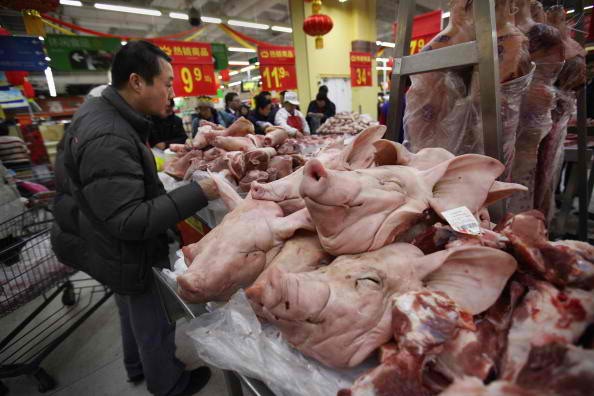Beijing's municipal government announced on Tuesday that it will unload 6.1 million pounds of frozen pork into the marketplace over the next two months in a bid to keep the price of pork down after surging more than 50 percent over the past year. As a result of this influx, officials say prices of meat should fall by approximately 18 percent.
The move marks the first time Beijing tried to control the pork market, although it had previously been attempted in other parts of the country. The importance of pork to China is tremendous: pork is the country's essential meat, with the word "pork" and "meat" meaning the same in Mandarin.
The Chinese character for "family" is a pig under a roof, while the pig is one of the 12 signs of the Chinese zodiac, signifying prosperity, fertility and virility. And because of that, analysts expect Chinese pork prices to create ripple effects around the world.
Since the liberalization of the farming industries in the late 1970s, pork consumption has skyrocketed in China. The country is now both the largest producer and consumer of pork, eating up approximately 60 percent of China's total meat consumption. According to the Washington Post, Chinese citizens consume pork more than two times as much as the global average.
In recent years, China's huge demand for pork has meant the country's economy, the world's biggest, can be affected by fluctuations in its price. In 2007, when swine flu wiped huge numbers of the pig population in China, the price of pork surged by nearly 87 percent.
Pork prices also became a key contributing factor in pushing the country's inflation rate to its highest levels in over a decade. And with food prices linked to civil unrest in the country, any fluctuations put China's leaders on edge.
In response to this, China established a national pork reserve in 2007, similar to how other nations maintain reserves of foreign currency, oil or grain. Through the reserve, the government can release more pork at times of high prices as well as take pigs from farmers during times where prices are lean.
The government also started to import more pork from abroad along with the feed crops to expand its own pig industry, further intertwining Chinese demand for pork with the global market. In 2013, the Chinese firm Shuanghui International bought Smithfield Foods, the world's largest pork producer, in a $4.7 billion deal.
But while a strategic pork reserve has its benefits, it also comes with its own slew of problems including the fact that frozen pork won't last more than a few months. In 2011, pork jumped 57 percent in a year, helping to lead a surge in inflation.
Current pork prices are now above the 2011 peak even after the establishment of the reserve, and it is unclear whether the government will really be able to help.
In 2014, the U.S. Department of Agriculture released a report arguing that any government attempts to buy pork when it got too cheap had "more of a psychological effect than an actual market impact."



























